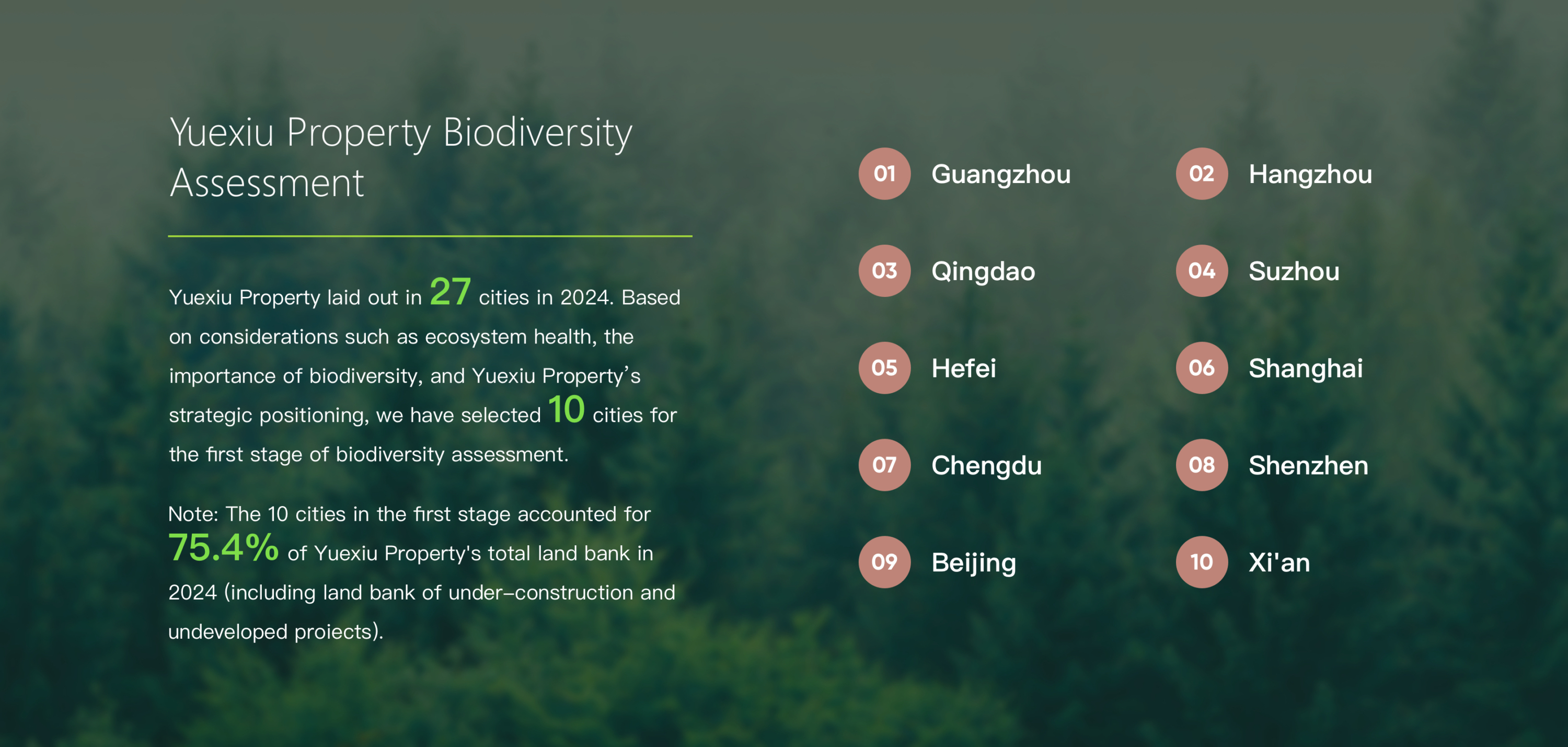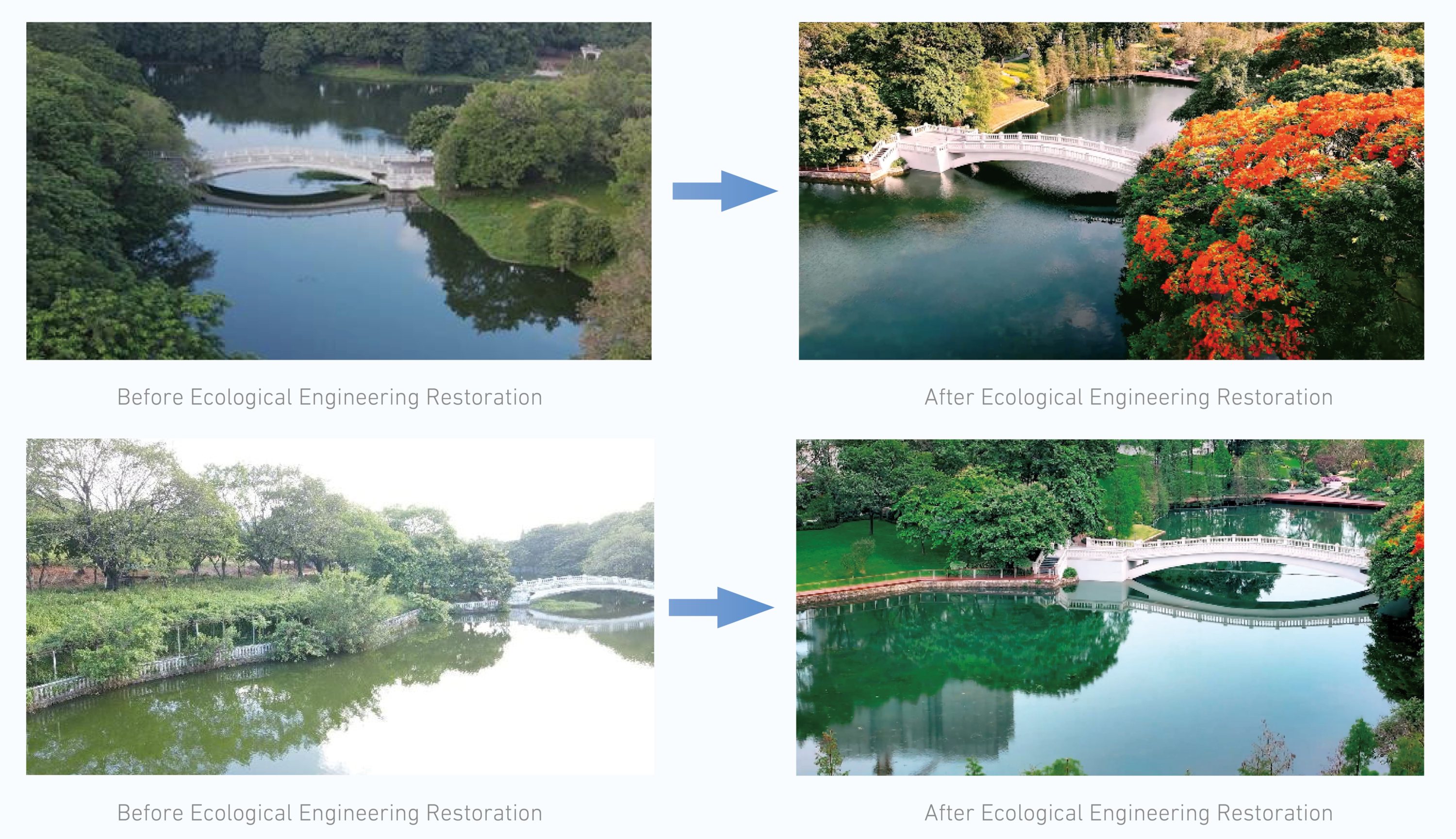Our industry is engaged in an important dialogue to improve the efficiency and resilience of real assets through transparency and industry collaboration. This article is a contribution to this larger conversation and does not necessarily reflect GRESB’s position.
This article was provided by GRESB Participant Yuexiu Property.
As global concerns over biodiversity loss and ecosystem degradation continue to escalate, nature-related risks have become a key issue that can no longer be ignored in strategic business decisions. The U.S. Green Building Council, in their 2023 Real Estate and Biodiversity: What You Need to Know, identified the buildings and construction sector as one of the main contributors to biodiversity loss, along with agriculture, extractive industries, energy production, and related infrastructure. These industries together are responsible for approximately 80% of global biodiversity loss.
This recognition is prompting a paradigm shift. Forward-thinking developers are no longer treating biodiversity as a secondary concern but rather as a strategic priority. Among emerging frameworks, the Taskforce on Nature-related Financial Disclosures (TNFD) is becoming a tool of choice to help companies assess and address their dependencies and impacts on nature. At Yuexiu Property, we are deeply aware of the interdependence between long-term business resilience and the health of natural ecosystems; as such, we have operationalized the TNFD framework and other environmental programs across our portfolio.
Applying the TNFD and protecting biodiversity in China—a case study
In 2024, guided by the TNFD-recommended framework, Yuexiu Property completed a biodiversity assessment across its entire value chain and in 10 major project cities. At the value chain level, we systematically applied the LEAP methodology to analyze the nature-related dependencies and impacts of Yuexiu Property over short-, medium-, and long-term operational cycles. Yuexiu Property assessed not only the direct ecological footprint of its business activities but also extended the analysis boundary to include the entire lifecycle of its upstream and downstream processes. Through a multidimensional analysis, we established a monitoring system encompassing 22 themes of nature dependencies and 11 themes of nature impacts.
In terms of project city assessment, based on considerations such as ecosystem health, the importance of biodiversity, and Yuexiu Property’s strategic positioning, we have selected 10 cities out of the 27 cities we have operations in, including Guangzhou, Hangzhou, Qingdao, Suzhou, Hefei, Shanghai, Chengdu, Shenzhen, Beijing, and Xi’an, to conduct the first stage of biodiversity assessment. The land bank of under-construction and undeveloped projects in these 10 cities accounted for 75.4% of Yuexiu Property’s total land bank in 2024. We conducted a comprehensive analysis of the 10 selected cities based on the distribution of important habitats and flagship species within a 50-kilometer radius. Through detailed data collection and scientific evaluation, we found that Shenzhen, Guangzhou, Hangzhou, and Shanghai face particularly severe challenges in ecological protection. These cities are not only adjacent to significant nature reserves but also host numerous endangered species, necessitating special attention and management during project development.

Ecological restoration project: The Moon Lake at Yuexiu World Garden
Yuexiu Property places great importance on the protection and restoration of the ecosystems surrounding its projects. Throughout the entire process, from site selection to project completion and acceptance, we adopt dedicated measures to ensure the health and sustainability of these ecosystems. We fully consider biodiversity and conduct relevant assessments in our new development projects and business operations, striving to minimize the impact of our activities on biodiversity and ecosystems. Meanwhile, we actively promote ecosystem protection and restoration, participating in projects aimed at rehabilitating natural environments and enhancing the health and diversity of ecosystems.
The Moon Lake Ecological Restoration Project at our Guangzhou Yuexiu World Garden was completed in 2024. Based on the theory of “atypical biological manipulation,” the project aimed to establish a complete, healthy, stable, and long-lasting clearwater ecological system comprising filter-feeding fish, zooplankton, submerged plants, benthic animals, and microbial communities, thereby enabling the water body to achieve sustainable self-purification capabilities. The projects followed five key steps: early-stage improvement works; construction of a submerged plant system; transparency improvement works; construction of an aquatic animal system; and creation of a floating-leaved plant landscape. The result is both visually appealing and ecologically resilient—a model for integrating green design with biodiversity outcomes.

The core business of real estate companies is closely related to land resources, the development and use of which directly affect natural ecosystems and biodiversity. In addition, real estate development may have negative impacts on water resources, air quality, ecosystems, and more. The TNFD can help companies assess these impacts and take measures to reduce their environmental footprint. By conducting the TNFD initiative, Yuexiu Property has gained a comprehensive understanding of the current status of biodiversity management at its project sites and throughout its supply chain. These findings have provided important insights for Yuexiu Property to develop its nature and biodiversity management strategy.
- The results of the biodiversity assessment show that the cities of Shenzhen, Guangzhou, Hangzhou, and Shanghai are close to nature reserves, ecological redline areas, or habitats of endangered species, indicating that development activities in these areas may have significant impacts on biodiversity. This indicated that we should prioritize these highly sensitive areas for biodiversity management and formulate ecological protection plans in advance to avoid violations and potential negative social and environmental impacts.
- The analyses show that the supply chain may have substantial impacts on ecosystems during the phases of raw material acquisition, transportation, and construction. This indicates that we should actively work with suppliers to promote sustainable procurement and environmental practices to reduce ecological impacts and enhance the sustainability of our overall operations.
Aligned with its own development plans and informed by the TNFD, Yuexiu Property has set targets for natural resources and biodiversity protection in its 2024 Sustainability Report:
- Conduct biodiversity assessments for 100% of its land development projects by 2030.
- Achieve net-zero loss by 2030.
- Achieve positive biodiversity impacts by 2060.
These targets will provide strong support for biodiversity protection and sustainable development both globally and within China.
As real estate developers face increasing regulatory, reputational, and environmental pressures, integrating biodiversity considerations into strategy is no longer optional—it is a business imperative. Frameworks like TNFD provide a pathway to systematically measure and manage nature-related risks. By embedding biodiversity into project planning, restoration design, and supply chain practices, the sector has the potential not only to reduce harm but also to regenerate ecosystems.
References
U.S. Green Building Council “Real Estate and Biodiversity: What You Need to Know” Accessed June 15, 2025. https://www.usgbc.org/resources/real-estate-and-biodiversity-what-you-need-know
For more details, visit the official website of Yuexiu Property to watch a video on the case study.
This article was written by Sustainability team at Yuexiu Property. Learn more about Yuexiu Property here.